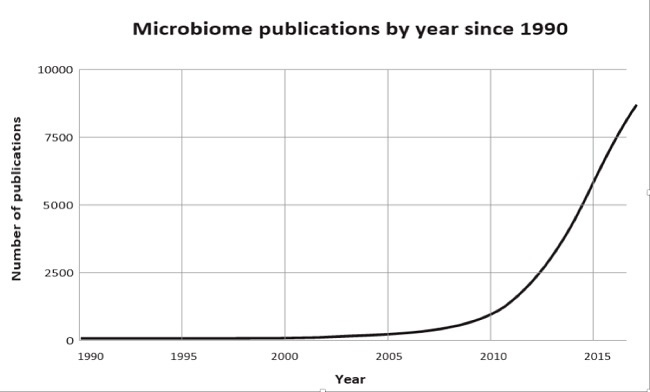We are delighted to have just had an article published in Positive Health Online, which talks about the importance of a healthy gut microbiome for physical and mental health.
The article is fairly long, so for those of you who just want a quick overview, read on!
What is the Microbiome? Why is the Microbiome important?
The human microbiome is made up of the microorganisms which live all over our body, from the surface of our skin to the inside of our gut. It’s been estimated that our bodies are made up of 10 times more bacterial cells than human cells (1)! (Although more recent research suggests that it might not be that straightforward.(2))
How all these organisms interact with our body is not yet fully understood. However, it is a rapidly growing area of medical research and there has been a boom in academic papers focusing on the importance of gut health.
These studies have found that bacteria have a variety of important roles. Some bacteria produce important hormones that regulate things such as mood (3) and weight gain (4), and other types of bacteria break down hard-to-digest foods (5) and even synthesise vitamins for us to absorb (6). A diverse microbiome is a healthy microbiome, and research has found that a healthy microbiome is important for good physical and mental health.
However, the modern Western diet is rich in processed food and sugar and low in fibre, fruit and vegetables. This devastates the diversity of our gut microbiome (7) and may have a profound impact on our health.

How the Microbiome affects Physical Health
About 70% of the body’s immune system is located in the gut, so it should come as no surprise that keeping the gut healthy is vital for good physical health. The composition of the microbiome has been associated with physical health challenges such as type 2 diabetes (8), arthritis (9), asthma and allergies (10), obesity (4) and many more conditions. Different diets can change the make-up of gut bacteria, and even promote types of bacteria that can cause obesity.
Top Tips for helping with physical health
- Avoid sugary foods as they upset the microbiome balance (11) and spike blood sugar.
- Eat fruit and vegetables rich in fibre to help bacteria flourish (7) and ensure that you eat enough vitamins and minerals to get the most out of your health.
- Sleep supports a healthy gut – aim for 7 hours per night and try and keep your sleep schedule regular. Disrupted sleep cycles lead to changes in the gut microbiome, which can change how we process sugar and over time can lead to weight gain, diabetes and obesity.
How the Microbiome affects Mental Health
A holistic approach to mental health is very important. The gut microbiome produces hormones that can regulate our mood, including 95% of the body’s feel-good hormone, serotonin. The relationship between the gut and the brain runs in both directions. A compromised gut could contribute to mental health problems, and problems in mental wellness can lead to changes in the gut microbiome. (12)
High levels of stress lead to imbalances in the microbiome (13), as well as increased risk of cardiovascular disease, anxiety and depression. You can care for your gut by avoiding and treating consistent, high levels of stress.
Take care of your microbiome, and let your health take care of itself.
This area of medical research is still growing and developing. However, it is clear that taking care of the microbiome is important for physical and mental health. By eating a balanced diet, avoiding sugary foods, getting enough sleep and managing our stress levels we can ensure that we have a balanced gut microbiome and can avoid many chronic health conditions.
You can check out our article at Positive Health Online here: http://www.positivehealth.com/article/colon-health/gut-health-the-immune-system-and-mental-health
References
1. Luckey TD. Introduction to intestinal microecology. The American Journal of Clinical Nutrition. 1972;25(12):1292–4. Available from: https://academic.oup.com/ajcn/article-abstract/25/12/1292/4819074
2. Abbott A. Scientists bust myth that our bodies have more bacteria than human cells [Internet]. Nature News. Nature Publishing Group; 2016 [cited 2020Jun26]. Available from: https://www.nature.com/news/scientists-bust-myth-that-our-bodies-have-more-bacteria-than-human-cells-1.19136
3. Huang T-T, Lai J-B, Du Y-L, Xu Y, Ruan L-M, Hu S-H. Current Understanding of Gut Microbiota in Mood Disorders: An Update of Human Studies. Frontiers in Genetics. 2019Feb19;10. Available from: https://www.ncbi.nlm.nih.gov/pmc/articles/PMC6389720/
4. John G, Wang L, Nanavati J, Twose C, Singh R, Mullin G. Dietary Alteration of the Gut Microbiome and Its Impact on Weight and Fat Mass: A Systematic Review and Meta-Analysis. Genes. 2018Mar16;9(3):167. Available from: https://www.ncbi.nlm.nih.gov/pmc/articles/PMC5867888/
5. Flint HJ, Scott KP, Duncan SH, Louis P, Forano E. Microbial degradation of complex carbohydrates in the gut. Gut Microbes. 2012Jul14;3(4):289–306. Available from: https://www.ncbi.nlm.nih.gov/pmc/articles/PMC3463488/
6. Biesalski HK. Nutrition meets the microbiome: micronutrients and the microbiota. Annals of the New York Academy of Sciences. 2016Jun30;1372(1):53–64. Available from: https://pubmed.ncbi.nlm.nih.gov/27362360/
7. Sonnenburg ED, Smits SA, Tikhonov M, Higginbottom SK, Wingreen NS, Sonnenburg JL. Diet-induced extinctions in the gut microbiota compound over generations. Nature. 2016Jan14;529(7585):212–5. Available from: https://www.ncbi.nlm.nih.gov/pmc/articles/PMC4850918/
8. Gurung M, Li Z, You H, Rodrigues R, Jump DB, Morgun A, et al. Role of gut microbiota in type 2 diabetes pathophysiology. EBioMedicine. 2020Jan;51:102590. Available from: https://www.ncbi.nlm.nih.gov/pmc/articles/PMC6948163/
9. Brusca SB, Abramson SB, Scher JU. Microbiome and mucosal inflammation as extra-articular triggers for rheumatoid arthritis and autoimmunity. Current Opinion in Rheumatology. 2014Jan;26(1):101–7. Available from: https://www.ncbi.nlm.nih.gov/pmc/articles/PMC4011633/
10. Fujimura KE, Lynch SV. Microbiota in Allergy and Asthma and the Emerging Relationship with the Gut Microbiome. Cell Host & Microbe. 2015May13;17(5):592–602. Available from: https://www.ncbi.nlm.nih.gov/pmc/articles/PMC4443817/
11. Townsend GE, Han W, Schwalm ND, Raghavan V, Barry NA, Goodman AL, et al. Dietary sugar silences a colonization factor in a mammalian gut symbiont. Proceedings of the National Academy of Sciences. 2018Dec17;116(1):233–8. Available from: https://pubmed.ncbi.nlm.nih.gov/30559205/
12. Clapp M, Aurora N, Herrera L, Bhatia M, Wilen E, Wakefield S. Gut microbiota’s effect on mental health: the gut-brain axis. Clinics and Practice. 2017Sep15;7(4):987. Available from: https://pubmed.ncbi.nlm.nih.gov/29071061/
13. Bharwani A, Mian MF, Foster JA, Surette MG, Bienenstock J, Forsythe P. Structural & functional consequences of chronic psychosocial stress on the microbiome & host. Psychoneuroendocrinology. 2016Jan;63:217–27. Available from: https://pubmed.ncbi.nlm.nih.gov/26479188/
